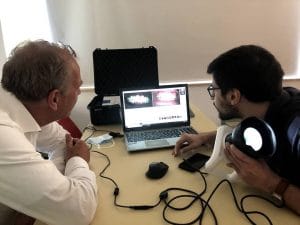Catania, April 5, 2022- The development of increasingly complex algorithms, the advancement of graphic processing and the growth of artificial intelligence led to a rapid progress in the diagnosis, treatment and rehabilitation of psychopathological issues in the field of mental health, ranging from post-traumatic stress disorder to addiction to substances of abuse. Smartphones apps, videogames and Virtual Reality are tools useful to support psychological therapies especially when it is not possible to interact with patients for the high costs of therapies, distance or unsuitability of the recipient.
Implementations of technological tools evaluated during the study “Update on Cyber Health Psychology: Virtual Reality and Mobile Health Tools in Psychotherapy, Clinical Rehabilitation, and Addiction Treatment”, coordinated by prof. Pasquale Caponnetto, adjunct professor of clinical psychology of addictions at the University of Catania and member of the CoEHAR, Center of Excellence for the acceleration of Harm Reduction.
Aim of the study was to investigated and analyzed the most recent implementations of technology in the fields of psychotherapy, clinical rehabilitation, and addiction treatment. In fact, the development of advanced digital solutions to provide psychological support is not only based on advanced software, but requires reliable data from scientific studies that evaluate the impact of these technologies, especially when the conventional methods seem to have no effect.
Among the most used technological tools is Virtual Reality, a complex and immersive experience: patients can actively interact with the environment through inputs transmitted with a controller or keyboard. Virtual Reality is used, for instance, in the treatment of Parkinson’s disorder or in psychotherapies with patients suffering from schizophrenic spectrum disorder.
Interesting data comes from the world of the mobile health support: considering that almost 92% of the italian population own a mobile phone, apps are frequently used in specific rehabilitation programs, for the treatment of alcohol or nicotine addiction.
Out of a total of more than 3556 articles, 28 met the review inclusion criteria. An evolving scientific framework emerged from the CoEHAR researchers study: virtual reality allows to reproduce detailed environments and realistic avatars, triggering responses, reactions, and emotions equivalent to those in the real world. It has numerous advantages, such as low costs and versatility and it allows for effective and short interventions without the use of drugs.
For even greater effectiveness and better treatment outcomes, it is always recommended to combine the tool with a parallel psychotherapy path, exploiting an integrated clinical approach. These tools are highly customizable to the needs of the individual patient and in some cases they can allow the treatment of psychotic symptoms of drug resistance.
“Giving patients the possibility to experience digital real-life situations with the support of a therapist means increasing the chances of success” explains Pasquale Caponnetto, author of the study. “The direct access to digital psychological support breaks the traditional patterns of therapy, guaranteeing constant support in smoking cessation programs, especially when the patient faces stress or anxiety, situation that can trigger the need to smoke. Low costs, high replicability and international access: the fight against smoking must conquer the digital world“.
App and mobile phone programs place the treatments of several clinical conditions into users’ hands, providing direct access to self-management tools and real-time interactive and social support, improving standardization and reducing the stigma connected to the disease. Interestingly, at the time of writing this review, there were no smartphone applications aimed at the treatment or use of drugs of abuse, researchers believe that the research is probably proceeding step by step in the development and exploration of these smartphone applications, trying to find a sufficiently effective design and model in smoking cessation to then be able to re-propose the same model for the treatment of other addictions.




